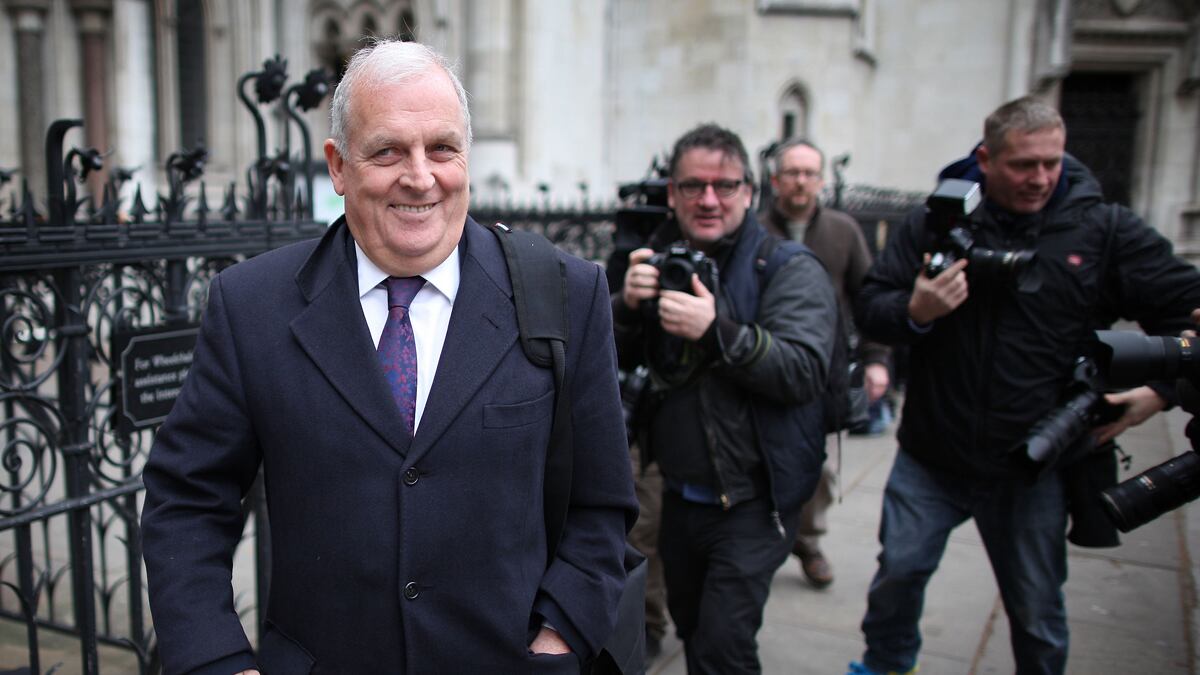Kelvin MacKenzie’s evidence to the Leveson inquiry today was everything we have come to expect of the archetypal “gutter press” editor: brash, chippy, and vindictive. He mimicked the nasal slur of former prime minister John Major. He argued with Lord Justice Brian Leveson. He even swore.
MacKenzie, 65, who edited The Sun newspaper from 1981 to 1994, was the first witness to appear at the Royal Courts of Justice since Leveson resumed proceedings after the Christmas break. The public inquiry was announced by Prime Minister David Cameron last summer. It is charged with examining press conduct, particularly the shocking revelations that newspapers owned by Rupert Murdoch had hacked the phones of people in the public eye. Those targeted included Princes William and Harry, as well as senior politicians and the actors Hugh Grant and Sienna Miller. News of the World, which has since been shut down by Murdoch, also hacked into the phone of Milly Dowler, 13, who was abducted on her way home from school and later murdered. Reporters used information gleaned from voicemail messages to run stories about their victims.
MacKenzie has already described the inquiry as “ludicrous,” and he opened his evidence by driving home his point. Asked by Leveson about his thinking on corporate governance, MacKenzie replied, in characteristic slack tones, “I didn’t spend too much time on ethics.”
Similarly, when Robert Jay, counsel for the inquiry, asked whether he had any regard for privacy while acting as editor of The Sun, he said, “Not really, no.”
“I took the view that most things should be published,” he elaborated, before stating that his litmus test on whether a story was factually accurate was “If it sounds right and it feels right, we’ll lob it in.”
He later expanded on his views. He said he took “the bullish approach to journalism—which is the First Amendment approach taken in America.”

His testimony was a blunt reminder of tabloid editors in the heyday of London’s Fleet Street. Despite the padded frame and thinned hair, MacKenzie, dressed in a midnight-blue suit and tie, was still recognizable as the reviled Sun editor—the slight squint in his right eye, the broad taunting grin—who became famous for his controversial headlines. During 51 minutes of testimony, he reveled in the old-school approach, dismissing a victim of press intrusion as “a devalued witness” and describing the editor’s office as an “hourly sprawl and general rioting.”
He described payments of £100 for unlisted phone numbers as “a reasonable investment,” and, when asked if there were payments to police officers, replied, “It wouldn’t surprise me if there were.”
While MacKenzie has memorably described his 13-year tenure as having a “positively downhill impact on journalism,” it was part of the foundations on which Rupert Murdoch built News International, his media empire. It was under MacKenzie that The Sun became the biggest-selling and most influential paper in Britain, with a daily readership of 4 million.
MacKenzie said he spoke to Murdoch every day. “His interest in The Sun then was hands-on,” he said. “[Murdoch] was interested in gossip, he had an interest in the paper. He’d have a general view of the feel of the paper—whether it was upbeat enough.”
MacKenzie also revealed that his relationship with his proprietor was every bit as explosive as the editor’s with his staff. Following the paper’s £1 million libel payout to the pop singer Elton John, Murdoch telephoned from New York to give MacKenzie “40 minutes of nonstop abuse.”
Mackenzie described himself as being “punchy and anti-establishment,” and he was certainly at pains to demonstrate this to the judges. In statements accompanying his evidence, he was asked what factors he took into account before publishing. “I didn’t take into account public interest (whatever that is) or private interest when deciding to print a story.”
When asked what role ethics plays in the print media, he said, “I do hope that this inquiry is not seeking to impose them on print journalism—that would be bloody funny to watch.”
He took a swipe at elements of both the media and the law, accusing them of snobbery (a once-favored refrain of Murdoch). He claimed that an illegally acquired story would be dealt with differently, depending on where it was printed. “If you publish in The Sun you get six months’ jail, and if you publish it in The Guardian you get a Pulitzer Prize.”
At times MacKenzie appeared almost nervous, removing and replacing his black-rimmed glasses and taking repeated sips from his water glass. He told the court that he had met with the prime minister about twice a year and with members of the cabinet about half a dozen times. “If you know politicians, the idea was for them to explain what geniuses they are to you.” He added, “I was always astonished that the prime minister would want to meet a tabloid editor with one GCSE [high-school graduate certificate]. I always struggled to see what the equivalence was in that.”
Asked about John Major, the prime minister who took over from Margaret Thatcher, MacKenzie said, “No, we did not have a particularly good relationship. He was no Thatcher, John Major.”
Then, smirking, he recalled a telephone conversation with Major, crassly mimicking the prime minister asking him about how he would report the day’s political events. He responded that he was “going to throw a bucket of shit over you.”
MacKenzie’s colorful performance and dogged portrayal of himself as a Fleet Street bad boy threw into stark relief the finessed, inscrutable style of News International's Rebekah Brooks, whose icy intellectualism allowed her to melt into the uppermost echelons of British society.
MacKenzie claimed that his departure had seen the beginning of a new era, and that subsequent editors, including Brooks, “were more cautious.”
Whether the inquiry finds that was indeed the case remains to be seen. Nonetheless, Leveson and MacKenzie found common ground on one point. When MacKenzie asserted, “There is no absolute truth in any newspapers, and there is no absolute truth in any court,” Leveson replied: “I agree.”






